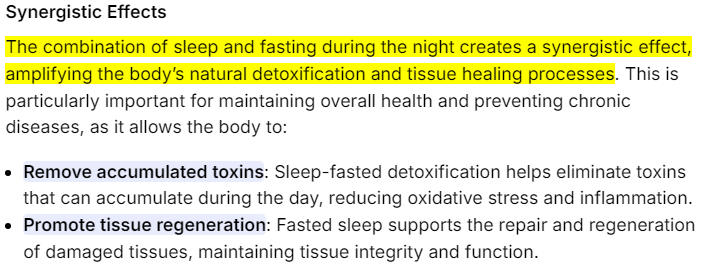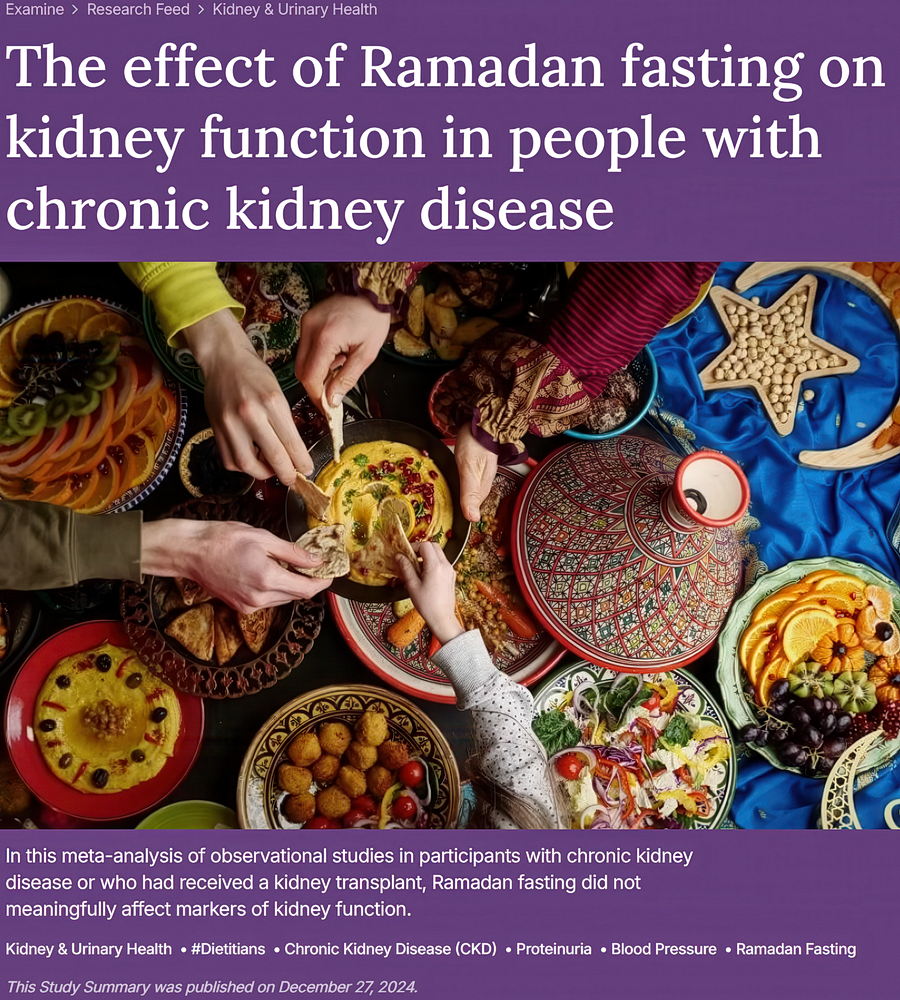Since there has been no real interesting articles or news as of lately, we once again return to Examine.com and one of their summaries of yet another really stupid meta-analysis.
What was studied?
“The effect of Ramadan fasting on kidney function in people who either had chronic kidney disease (CKD) or received a kidney transplant.
The primary outcomes were changes in creatinine and estimated glomerular filtration rate.”
First, let’s define fasting. Fasting is the state when the body starts feeding itself using body fat and damaged tissue as fuel and as material for tissue repair and regeneration. Thus, being in a true fasted state does not happen until your last meal has been fully absorbed and your glycogen stores have been reduced to their natural content as maintained by gluconeogenesis.
In a fat-adapted human that is following our natural human diet of only animal-based foods and being in ketosis, running on our natural fat metabolism, this can happen after 8 to 16 hours depending on meal sizes and adaptation. However, in someone who has been deceived to consume carbohydrates, this usually does not happen until after 24 hours. In someone with poor fat metabolism and full glycogen stores from overeating carbohydrates, it can take 2-3 days, as in 48 to 72 hours to truly enter a fasting state.
Anything less than this is not fasting, it’s “intermittent fasting” or “time-restricted eating.”
So, Ramadan is simply a form of time-restricted eating done completely wrong, and I’ll get to that in a minute. Now, having a fasting window, as in not consuming any food, could potentially unload some of the recurring burdens on the kidneys, as they process and eliminate waste products, including toxins from ingested substances, and thus abstaining from food for a while will give them a small window to heal and recover during that time period (the “not eating period.”)

However, Ramadan is correctly practiced by starting the day with a pre-dawn meal (Suhur,) where Muslims typically eat a light meal before dawn, around 4:00 a.m., to break their overnight fast. After this, they fast during the day and once again break their fast (Iftar) at sunset. Muslims break their Iftar fast with one large meal, often with family and friends. As sunset is about 6:30 PM in Mecca, that is a fasting window of 12 to 13 hours at most, as the digestion of the pre-dawn meal will take 2-3 hours. While this will reduce the stress on the kidneys (if they are damaged,) the practice of eating a large meal after 6:30 PM, as in around 7:00 PM, and likely not being finished before 8:00 PM, means that digestion will take place until around 4:00 AM, or even later as digestion slows down once you sleep. And that is when they get up to have their Suhur pre-dawn meal!

In other words, they never reach a fasted state during sleep. And as you should know, in order to detoxify and heal during the night, where these processes are accelerated, we need to be in a fasting state. However, with the backwards practice of Ramadan, you will not. You will be digesting and assimilating food most or all of the night, a terrible burden on damaged kidneys, especially since the body relocates resources for sleeping and everything slows down.


Note: time of digestion is a combination of the time it takes for the stomach to empty itself and the time it takes for the food to transit through the small intestine where nutrients are absorbed and hit the bloodstream. However, this is like a flowing river. As soon as the small intestine begins to get some food from the gastric emptying, it begins to absorb nutrients. So, usually we say that for a large meal, digestion takes place for about 6 to 8 hours with the peak of absorption happening between 3 to 6 hours after the meal.

So, simply by understanding these basic principles of physiology, we can determine that Ramadan will do absolutely nothing for kidney health as there will be a little step forward during the day and the fasting, and then one giant step backwards with the idiotic late meal and the interference with sleep.
Also, during Iftar, the main courses are usually stews, stuffed vegetables, kebabs, rice dishes and some grilled meat. Only the meat is non-toxic, but being grilled is far from optimal. All the other stuff is highly toxic and will really tax the kidneys.
Then they have sides such as even more toxic vegetables and even fruit (fructose,) and slave-food like bread and/or legumes, which are terribly toxic.
And of course, they have desserts like Kellaj (sweet pastry) and more dried fruits and fresh fruits, adding to the toxic fructose load and all defense chemicals and antinutrients.
So, this is really a terrible and very unhealthy practice. Not only by doing intermittent fasting or “time-restricted eating” backwards, hindering our natural boosted detoxification and healing processes during sleep, but mostly because of the terrible and unhealthy food choices.



Who was studied?
“A total of 2,952 participants who either had CKD or received a kidney transplant.”
They will not benefit from this backwards fasting and over-indulgence of toxic slave-food. Actually, if monitored for a long period of time, they would likely see increased kidney damage.
How was it studied?
“A meta-analysis of 32 observational studies (including 29 with a prospective design) was performed. Most of the studies were conducted in the Middle East, including Saudi Arabia (7 studies), Egypt (4 studies), Turkey (4 studies), United Arab Emirates (4 studies), and Iran (3 studies). The duration of fasting ranged from 11 to 18 hours, and the median ambient temperature during the studies was 28℃/82°F.”
No, the duration of fasting is from sunrise to sunset, it only varies by an hour or two. And the fact that most studies were from the Middle East and Egypt means that they are real Muslims sticking with traditions of both a pre-dawn meal (Suhur) and a sun-set meal (Iftar.)
If a few of them fasted for 18 hours, it means that they did not perform Ramadan correctly and skipped the pre-dawn meal. And those doing 11 hours likely had Suhur way later that tradition dictates, as in 8 AM or thereabout. That is not Ramadan.
What were the results?
“Overall, Ramadan fasting did not meaningfully affect the markers of kidney function that were evaluated.”
Of course not, as it’s backwards and the choice of food items are abysmal. However, properly executed time-restricted eating, or intermittent fasting, as in eating early in the day and fasting from the afternoon until the next morning will not only help and heal the kidneys, but the entire body — as you will be in a true fasted state during sleep. That is simply basic biology and physiology, and it’s also common sense.
Read more about the idiocy and dangers of eating late, as in closer than 4 to 6 hours before bedtime, in my articles “No, Never Eat Late in the Evening or at Night,” and “Eating In The Evening Contributes To Diabetes? Eating Late Is Always Bad!”
And, of course, how to do time-restricted eating correctly: “Time-Restricted Eating (Intermittent Fasting) Done The Right Way” and “Time-Restricted Eating Is Our Natural Approach To Food (Detoxing, Healing, Fat Loss).”
If you need help with any kind of health problems or transitioning from your current way of eating to our natural species-appropriate, species-specific way of eating, I’m available for both coaching and consultation.
Coaching and Consultation
And if you found the article and my insights helpful and enjoy my daily free information, please consider donating to help pay the webhosting bills and keep the site running. And if you’re interested in discussing and sharing information with likeminded people, consider joining our uncensored community at Ungovernable.se. Thank you!

